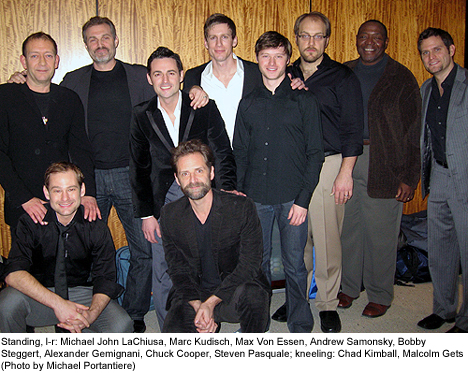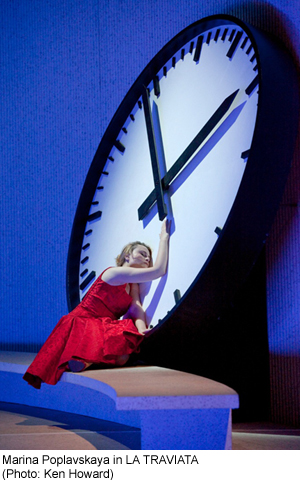
Fans of Richard Rodgers, Cole Porter, Jule Styne, and other iconic composers have many chances to hear their music played and sung in concerts, cabaret acts, and major revivals of their Broadway hits. As for the shows and songs of Stephen Sondheim, they are always so easily accessible in one venue or another that Sondheim junkies never have to go very long between fixes. But opportunities to hear the works of the great Kurt Weill performed live are comparatively rare.
So one can imagine that Weiillophiles are positively vibrating over what's about to happen: Two of the master's lesser known scores, Knickerbocker Holiday and Lost in the Stars, are to receive very high-profile, limited-run resurrections in NYC in the space of a fortnight. If that coincidence isn't amazing enough, consider that both shows have book and lyrics by Maxwell Anderson, and they represent the only two Weill/Anderson collaborations in the canon.
First up is Knickerbocker Holiday, which will be presented by the Collegiate Chorale at Alice Tully Hall for two performances only on Tuesday and Wednesday, January 25 & 26. Directed by Ted Sperling, with James Bagwell conducting the chorale and the American Symphony Orchestra, this concert version of the show boasts a cast headed by Ben Davis, Christopher Fitzgerald, Victor Garber, David Garrison, Kelli O'Hara, and Bryce Pinkham. The original production opened in October 1938 and ran for 168 performances. Though the score yielded two gorgeous ballads that have become standards, "September Song" and "It Never Was You," the show itself is almost never revived, probably because it's very old fashioned in style if not in subject matter. Ted Sperling was kind enough to summarize the plot for me:
"This is a show about tyranny. It was written in response to Hitler's rise -- I think that was Kurt Weill's motivation -- and it also reflects Maxwell Anderson's unease with FDR and The New Deal. Which is interesting because, these days, we view those two things as almost polar opposites. The action of the show takes place in New Amsterdam, and the plot concerns a corrupt town government led by a guy named Tienhoven. The day of Governor Peter Stuyvesant's arrival in New Amsterdam from Holland happens to be Hanging Day, so the townspeople are scrambling to find somebody to hang. They decide to hang this fellow named Brom, but they can't find a cause, so they trump one up. He's about to be hanged when Stuyvesant arrives and pardons him, but Stuyvesant puts a whole new set of laws into effect which basically give him complete power over the village. Then he decides he wants to marry Tina, the heroine, who wants to marry Brom; it's to her that Stuyvesant sings 'September Song,' because he's considerably older than she is. There are hijinks and complications, but ultimately Stuyvesant is sent packing, the government reverts back to a more free-wheeling democratic system, and the young lovers are free to marry.
"This was only Weill's second Broadway show, after Johnny Johnson," Sperling notes. "To me, It feels like a transitional piece; it has a lot of Broadway flavor but also some of the jagged, spiky, almost sinister harmonies that his German stuff has. The show precedes Oklahoma! by five years, but it's a fairly well integrated musical, though the overall tone is very satiric and comic. I think Weill was a great innovator, and his shows are very modern for their time. Love Life and Lady in the Dark in particular are very experimental shows. Maybe that's why they're not performed more often. One Touch of Venus and Street Scene, which in some ways are his most conventional works, get done a lot."
There's one thing Sperling would like to make very clear as a disclaimer: "New Amsterdam was a tiny village located at the very tip of Manhattan, surrounded by a forest populated by Native Americans. In this piece, the Native Americans are the unseen enemy, and they're not dealt with in what we today would consider a sensitive fashion. I wasn't sure what to do about that, but I finally decided we couldn't pretend it didn't exist. The plot sort of hinges on it. So we're just presenting it all very honestly as it was written, and I hope everybody will understand that the show is definitely of its time in terms of political correctness."
Scarcely less obscure than Knickerbocker Holiday is Lost in the Stars, which will be presented February 3-6 by City Center Encores! Directed by Gary Griffin and choreographed by Chase Brock, with music direction by Rob Berman, the production has a cast led by Chuck Cooper, Daniel Breaker, Sherry Boone, Patina Miller, Quentin Earl Darrington, Daniel Gerroll, Stephen Kunken, and James Rebhorn.
Based on the novel Cry the Beloved Country, the show is described in the Encores! press materials as "a stinging indictment of apartheid South Africa through the story of two aging men, one black, one white, who are brought together by a shared grief." The original production opened at the Music Box in October 1949 and ran 281 performances. I spoke with Chuck Cooper, who's playing the central role of Stephen Kumalo for Encores!, about this extraordinary work -- and given the subject matter of the piece, it seemed highly appropriate that our discussion took place on Martin Luther King Day.
"The show is stunning, really bold and brave," says Cooper. "Certainly, the evil of apartheid was something that deserved to be put under a microscope. The theater at its best can shed light on issues like that and cause us to take a look at ourselves and make improvements. All things are connected, so I think Lost in the Stars was probably one of the kernels or seeds that helped bring about the end of apartheid many years later. It's amazing that they had the balls to do this show, that they raised the money to do it, and that it was received so well.
"Lost in the Stars has one of the best scores ever written," Cooper continues. "It's so interesting that Weill, who came to America from Germany to escape the Nazis, is in many ways a quintessential American composer. I think his music captures the breadth of this country. In many ways, immigrants are the people who seem to really grasp what it means to be an American. Weill was able to grasp it and trasmute it into music. The book [of Lost in the Stars] may seem a little dated in terms of the style of the language, but nevertheless, the message is as profound as it was when Anderson and Weill wrote the show. It's all about how the truth hurts. The truth can really be painful and it's often very difficult to stand up and tell the truth, as the young man in this story finds out."
A film version of Lost in the Stars exists, but like such other movies of Weill musicals as Lady in the Dark, One Touch of Venus, and Knickerbocker Holiday, it doesn't present an accurate picture of the stage show. "I just watched it the other day," Cooper tells me. "A friend of mine took it out of the library for me, and I think it may even be available on Netflix. It's not a very faithful film; many of the songs are done in different settings and in a different order. They did their Hollywood thing with it. But Brock Peters plays Stephen Kumalo, and he's pretty great. I'm honored to be a part of the Encores! production, especially because this show is so rarely done. I think it's a piece that people who love musical theater will really respond to. It's a perfect choice for Encores!"


